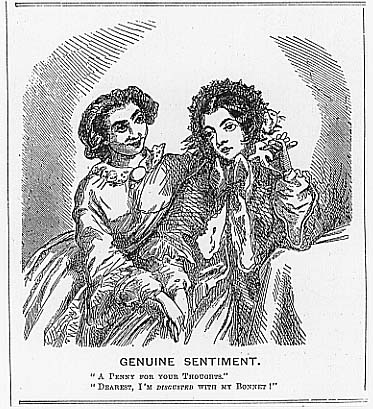
Punch XXV (July-December 1853): 244

Punch XXV (July-December 1853): 244
 his image is one of the many in the pages of Punch in this
period that depicts ladies of a certain class in the throes of
fashion, so to speak. Here, the heartfelt angst of a charming
young woman over the state of her bonnet is the comic jibe; the
two women are clearly bosom friends, as the 'dearest' implies,
and yet the deepest exchange between them is a question of
millinery.
his image is one of the many in the pages of Punch in this
period that depicts ladies of a certain class in the throes of
fashion, so to speak. Here, the heartfelt angst of a charming
young woman over the state of her bonnet is the comic jibe; the
two women are clearly bosom friends, as the 'dearest' implies,
and yet the deepest exchange between them is a question of
millinery.Like "Touching Simplicity," this earlier cartoon highlights the limited intellectual capacity of women. Her thoughts are truly worth a penny -- frivolous vanity is the most important thing on her mind. And yet the tone is one of benignly condescending humor; it is significant that the girls retain their placid gentility, for the piece demonstrates the complexity of Victorian attitudes towards women. They were believed to be less rationally intelligent than their male counterparts, and hence less educable. The education of girls of any social class was aimed almost entirely at creating charming companions and capable mothers for the future. Lessons in French, drawing, piano, and dancing would make a young woman a talented and entertaining partner, while her experience with needlework and household management, often at the hand of her mother, would guarantee her ability to create a calm and comfortable home for her future family. Widespread medical opinion condemned more strenuous intellectual pursuits for girls, on the basis of their biological differences; subjects like geometry and physical science were deemed heavily taxing on the female brain, and much of the Classical canon was seen as improper for delicate sensibilities. It is one of the greater paradoxes of the period that the intellectual deficiency and psychological inferiority commonly ascribed to women (and cited as grounds for their exclusion from higher formal education) was also encouraged, to a large degree, by popular ideology, epitomized in "Genuine Sentiment." Women were ridiculed for their absorption in the frivolous, trivial details of life -- fashions, propriety, manners, and gossip -- and yet these were among the few subjects deemed appropriate to their sphere.
Click here for "Positively the Last of the Long Skirts"
[Victorian initial "T" by Harlan Wallach ©copyright 1994.]